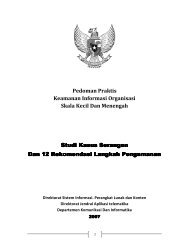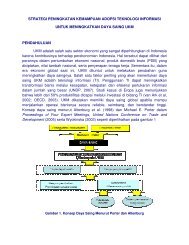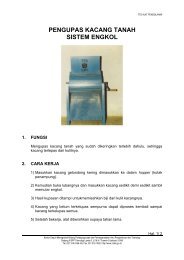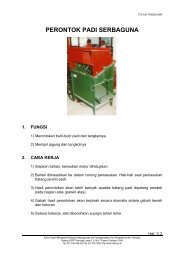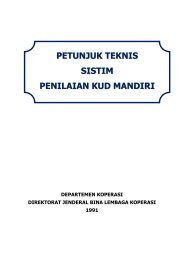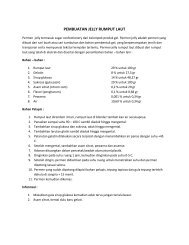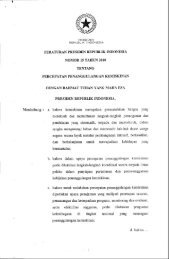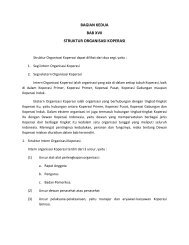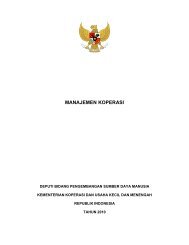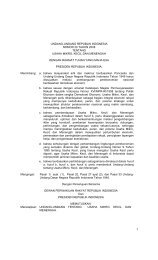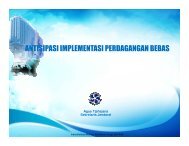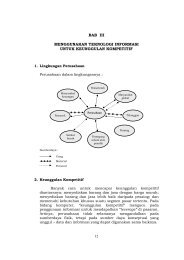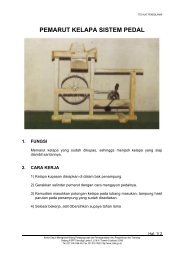Jurnal Pengkajian Koperasi dan UKM - Smecda
Jurnal Pengkajian Koperasi dan UKM - Smecda
Jurnal Pengkajian Koperasi dan UKM - Smecda
You also want an ePaper? Increase the reach of your titles
YUMPU automatically turns print PDFs into web optimized ePapers that Google loves.
CURRENT CONTENT<br />
JOURNAL COOPERATIVE ASSESSMENT AND SMALL MEDIUM ENTERPRISES<br />
ISSN 1978-2896 Issued: September 2011<br />
shares contribution. Meanwhile shares contribution for<br />
border areas between Belu district and Timor Leste<br />
increase from 3% to 10%. This model is designed in<br />
accor<strong>dan</strong>ce with the trend scenario for people who only<br />
sell raw materials without processing by creating a<br />
semi-finished goods or final products.<br />
Key words: SMEs model, disadvantage areas and<br />
border region<br />
Akhmad Junaidi (Deputy Minister For Research &<br />
Development of SME & Cooperative Resources) and<br />
Muhammad Joni (Deputy Minister of Development and<br />
Business Restructuring)<br />
UTILIZATION OF INTELECTUAL PROPERTY<br />
RIGHTS CERTIFICATES AS COLLATERAL LOAN<br />
JRL. Coop. Sept. 2011 Vol. 6-Sept. h. 124 - 141<br />
Assessmt.<br />
and SME<br />
Intellectual Property Rights (IPRs) in developed<br />
countries have increased their use as collateral to<br />
obtain loans or financing from financial institutions.<br />
The economic value of IPR can be determined by<br />
calculating the market value for example, the cost of<br />
making/reproduction, depreciation replacement cost,<br />
liquidation value, and value of insurance. The problem<br />
faced in Indonesia is the unavailability of the provisions<br />
on the use of IPR as collateral in loans, the banking<br />
system. The purpose utilizes IPR as collateral loan is to<br />
assist SMEs and Cooperatives in completing the credit<br />
requirements. Although the IPR can be used as loan<br />
collateral, but the position in the underwriting<br />
agreement to an additional agreement complements the<br />
primary credit agreement. This research uses<br />
descriptive analysis to conduct focused literature review<br />
to explore an important role, IPR rules and regulations<br />
guarantee bank lending in Indonesia. IPR has the<br />
prospect to be used as collateral for loans, because the<br />
IPR has an economic value can be calculated based on<br />
market prices, can be executed, can be transferred<br />
either wholly or partly by inheritance, grants, wills,<br />
written agreement or other causes that are justified by<br />
the law of rules. In addition, the loan guarantee<br />
agreement, including the use of IPRs as collateral is<br />
generally associated with the raw action and<br />
executorial.<br />
Key words: Intelectual Property Right (IPR), collateral<br />
Riana Panggabean (Deputy Minister For Research &<br />
Development of SME & Cooperative Resources)<br />
ANALYSIS OF EQUIPMENT NEEDS AT THE CENTER<br />
POTTERY<br />
JRL. Coop. Sept. 2011 Vol. 6-Sept. h. 142 - 158<br />
Assessmt.<br />
and SME<br />
The purpose of this research is to find out the needs<br />
assessment of equipment/technology for SMEs in the<br />
center of ceramics and learn optimization of<br />
equipment/technology pottery. The benefits of this<br />
research as an input for policy makers in order to<br />
develop the role of SMEs in the center of earthenware<br />
pottery and quality improvement in accor<strong>dan</strong>ce with<br />
market demand.<br />
Conclusions and recommendations of this research<br />
are SMEs and most of the pottery craftsmen still using<br />
simple technology. This type of equipment needs/Potter's<br />
technology can be grouped into three types of technology<br />
for the processing of raw materials, forming, printing<br />
and marketing.<br />
To optimize equipment/technology, SMEs and<br />
craftsmen/artisans need education and capital. There is a<br />
desire that SMEs want to have the modern<br />
equipment/technology but do not have the ability to buy.<br />
In general, the craftsmen do not have the capability of<br />
capital. It is therefore necessary to have capital to buy<br />
and operate this type of technology based on demand.<br />
In addition to operationalize equipment/technology,<br />
English language education is also needed for SMEs and<br />
craftsmen in order to cater buyers from abroad.<br />
Key words: need of equipments/technology, SMEs,<br />
education and capital



